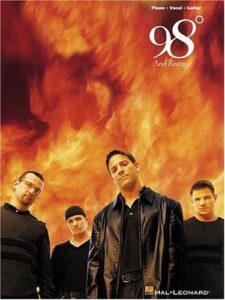 By Jae-Ha Kim
By Jae-Ha Kim
Chicago Sun-Times
April 11, 1999
Drew Lachey’s got a little something to say about the boy band phenomenon – or, depending on how you look at it, stigma.
“We were completely in the dark about the whole boy band thing,” says Lachey, one of the singers in 98º, which will appear Tuesday at the Rosemont Theatre. “When we formed the group (in 1995), we wanted to be like Jodeci and Boyz II Men. We all grew up singing in choirs and had a love for harmonizing.”
Of course, that’s what the guys in the Backstreet Boys and ‘N Sync say as well.
Lachey is aware of this. And he also knows that while his group has been around for four years, its popularity followed theirs.
“Sometimes reporters will ask us, `What’s the difference between you and the other boy bands?’ ” says Lachey, 22. “And we’ll tell them. Then they’ll say, `OK, but what’s the difference?’
“What can I say to that? I can just try to describe our music the best as I can. But sometimes that isn’t enough. If all they see is that we’re `boys’ singing pop music and harmonizing, then there’s not much I can say to change that.”
Boy bands are not to be confused with bands with boys (or men) in them.
For instance, the three teenagers in Silverchair were never categorized as a boy band, even though they were just 15 when they caused a ruckus with their hit debut album. Now 19, the trio still writes the material they sing, and play their own instruments, and they have never had a choreographer work on their stage moves.
For most boy bands, the right choreography is almost as important as picking the right stable of songwriters to pen the numbers.
Lachey wants to make it clear that 98º is not about dance steps. “I’ve heard interviews by other groups,” he says. “And they were talking about what fans could expect at their concerts – dancing, lights and just all that stuff. But they never mentioned good music or great vocals. For us, it’s all about the music. We don’t dance around that much and we’re the first to say that that’s not our strength. Our strength is our vocals.”
The vocals are courtesy of Lachey, his older brother, Nick, 25; Jeff Timmons, 25, and Justin Jeffre, 26.
In many ways, boy bands are a throwback to an earlier era when singers and their management formed lasting relationships with songwriters. Then along came the Beatles, who made it passe and embarrassing for artists to be anything but hyphenated singers-songwriters-instrumentalists.
Contrary to popular misconception, the Ohio-based 98º wrote about half the songs on their hit album “98º and Rising.” But Lachey says that if they’re unable to write quality material, they’d be just as happy to have no original songs on their next record.
“It’s kind of a Catch-22 situation because you want to grow and mature and reap the financial benefits of writing your own songs,” admits Lachey, a former Army medic. “That’s really where artists make the money. But it’s ridiculous to turn your back on great songs just because you didn’t write them. For us it’s about whatever the best music is. We don’t have these huge egos yet where every song we perform has to be one that we wrote.”
He adds, “We wrote and produced one song on our first album. And on this past album, we wrote and produced half of it. We’re definitely more confident songwriters now than we were in 1995.”
They’re also thankful to their core group of fans – teen girls.
“We try to treat people the same way that we want to be treated,” Lachey says. “I think people are surprised that we usually show up on time and try to treat people with respect.
“We understand that we have no career without the media, radio and, most importantly, our fans. We intend on being around for a very long time. And hopefully, those girls will grow up with us.”